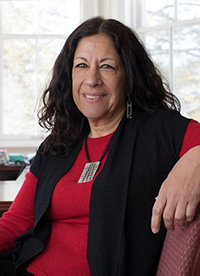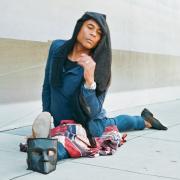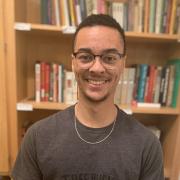Rose Olver Prize
Congratulations to Huey Hewitt '19, the 2019 winner of the Rose Olver Prize for his Department of Black Studies honors thesis Gender is Carceral: Trans Black Imprisonment in the Age of Mass Incarceration.
Thesis Abstract: Gender is Carceral: Trans Black Imprisonment in the Age of Mass Incarceration is a thesis written for the Black Studies Department which approaches the subject of black trans people in prison, when little to no academic literature exists on the topic—despite the astonishing NTDS figure estimating that 47% of black trans people have been or are currently incarcerated. I argue that racialized gender regulation and discipline are carceral state machineries. Mirroring Peter Winn’s attempts in Weavers of Revolution, wherein he writes a “history-in-the-making” of workers’ movements in Allende’s Chile (and their repression under Pinochet), the thesis is a contemporary history of black trans incarceration. Letters between myself and trans black people behind bars, in addition to past and present newspapers, comprise the bulk of my primary source materials. In the absence of existing literature on the subject, my thesis attempts to bridge scholarship on gendered coloniality and enslavement, gender socialization generally, blackness, and the prison, positing that racialized expectations based on assigned sex are, in the age of mass incarceration, fundamentally carceral. Such work is crucial, and truly new, to the emerging Transgender Studies canon.
This prize is awarded annually to the thesis that best analyzes the construction of gender in conjunction with the historical, political, social, cultural, or psychological experiences of subjects. The thesis should also address gender relations as they intersect with class, race, sexuality, or nationality. Finally, the thesis should consider the broader implications of its conclusions for the field of sexuality, women’s, and gender studies.
More information about the Rose Olver Prize is available on our website.
Rose Olver Student Research Fund
Congratulations to Benedite Dieujuste '20, the 2019 winner and first recipient of the Rose Olver Student Research Fund.
Research Project: Benedite is interested in comparing the change in the language used in family planning policies by medical providers, government agencies, and nongovernmental agencies in the United States specifically during the “neo-Malthusian” revival of the 1960s to current policies. She intends to investigate the literature circulated by NGOs, the wording of state legislature, and the statements released by medical associations as well as images of advertisements for birth control methods and which women are represented. By taking an interdisciplinary approach that analyzes the linguistic and visual rhetoric of these two eras, she hopes to better understand the change in the politics of domestic reproductive health.
The Rose Olver Student Research Fund was endowed by John Olver in memory of his wife, Rose, who taught at Amherst for fifty years in the Departments of Psychology and Women and Gender Studies (later renamed the Department of Sexuality, Women’s and Gender Studies [SWAGS]). It is used to support summer research for rising juniors or seniors who are majoring in either psychology or SWAGS. Rose Olver Summer Research Fellows receive income for all aspects of the summer experience, including a stipend, housing, meals, research needs, and relevant travel.
More information about the Rose Olver Student Research Fund is available on our website.
David Kirp 1965 Stonewall Prize
Congratulations to Marvin Bell '19E, the 2019 winner of the David Kirp 1965 Stonewall Prize for his Departments of Anthropology and Sociology honors thesis Forgotten, But Not Gone: The HIV/AIDS Epidemic in Jackson, Mississippi.
Excerpt from Chapter One:
“I am afraid that the reality that will develop in Jackson in the coming years will be frightening, even more frightening than has been projected,” Dr. Bryman Williams of the clinical training program at Jackson State University told the gathering of 250 attendees in a keynote address at Jackson Medical Mall. His sense of an impending catastrophe was hardly misplaced, and it is now unquestionably, even if belatedly, accepted that the HIV/AIDS epidemic in Jackson is a public policy concern of unparalleled importance, with a likely impact of overwhelming consequence well into coming years. The epidemic in Jackson forces questions, Dr. Williams told the audience, regarding urbanization, changes in morality/lifestyle, agency and individuality, public interest and, perhaps most importantly, society’s obligation to those on the periphery — those individuals who have been stigmatized, discriminated against, ridiculed, and treated as less than full and equal citizens. Within the context of the HIV/AIDS epidemic in Jackson, the individuals at the center of contestation are Black men who have sex with men (MSM)[1]. Indeed, the epidemic in Jackson requires us to ask whether Mississippi can discharge its responsibilities to this population without validating the persistent labels about itself as inhospitable to queer and trans individuals.
These are questions that are evaded at the state-level in Mississippi because they raise issues about the nature of the state’s most deeply rooted fears and anxieties and the role of repression and denial in the conduct of private morality and public affairs. Much of the concern around HIV/AIDS, of course, is inextricably related to the nature of the virus and the manner in which it is manifested. “AIDS requires,” Marshall Forstein wrote over thirty years ago, “that we take the most difficult, most emotionally charged concerns of our civilization and within the extremes of existing values, morals, social structures, and economics cut through to the essential tasks involved in halting a sexually transmitted disease” (O’Malley 1988, 7). The prolonged silence of Mississippi legislative bodies is, in large part, due to the unwillingness to address the issues of sexuality, especially homosexuality, and the structural forces that will be implicated if the epidemic is scrutinized.
[1]Men who have sex with me (MSM) – This term is often used when discussing sexual health. Researchers have come to use this phrase as a way to be inclusive of all men who have sex with men regardless of what their sexual identity is. It has become increasingly problematic because it obscures social dimensions of sexuality and does not encapsulate variations in sexual behavior and expression. I embrace it in this research because that is how most of the men I met identified.
The David Kirp '65 Stonewall Prize Fund was established in 1989 and is awarded to one or two students who produce a work of exceptional intellectual or artistic merit pertaining to the queer, bisexual, intersex, gay, lesbian, or transgender experience.
More information about the David Kirp 1965 Stonewall Prize is available on our website.

















